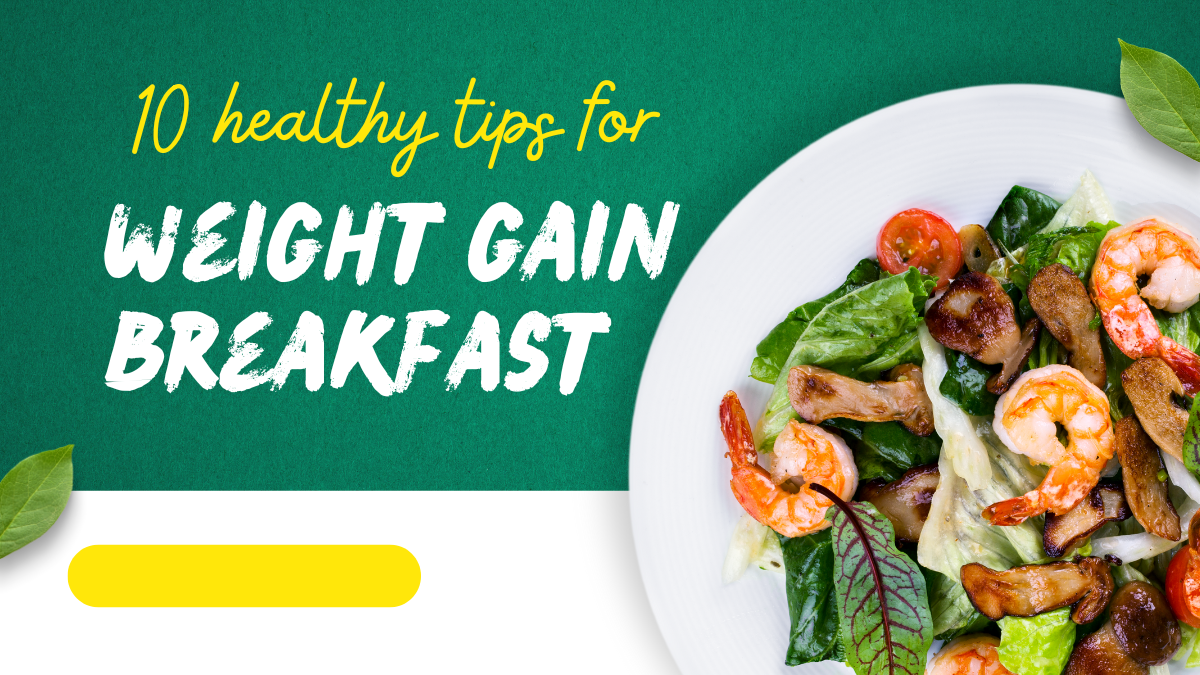
Introduction
Starting the day with a nourishing weight gain breakfast sets the tone for a healthy lifestyle. While many associate breakfast with weight loss, individuals looking to gain weight often struggle to find suitable options. However, with the right approach, breakfast can become a vital tool in achieving weight gain goals.
Table of Contents
1.Understanding the Importance of a Balanced Breakfast
Benefits of a Nutritious Breakfast
A balanced weight gain breakfast fuels the body with essential nutrients after an overnight fast. It jumpstarts metabolism, providing energy for daily activities. Additionally, a wholesome breakfast can improve concentration and mood, leading to increased productivity.
Impact on Metabolism and Energy Levels
Skipping breakfast can lead to sluggishness and poor food choices later in the day. Conversely, a well-rounded breakfast stabilizes blood sugar levels, preventing energy crashes and cravings.
2. Essential Components of a Weight Gain Breakfast
To promote weight gain breakfast should consist of protein-rich foods, healthy fats, and complex carbohydrates. These macronutrients provide sustained energy and support muscle growth.
Protein-Rich Foods
Incorporating sources of lean protein such as eggs, Greek yogurt, and cottage cheese helps build and repair muscle tissue. Protein also promotes satiety, reducing the likelihood of overeating later in the day.
Healthy Fats
Including sources of healthy fats like avocado, nuts, and seeds adds calorie density to breakfast meals. Fats are essential for hormone production and nutrient absorption, contributing to overall health.
Complex Carbohydrates
Opting for whole grains such as oats, quinoa, and whole wheat bread provides a steady release of energy throughout the morning. Complex carbohydrates are rich in fiber, aiding digestion and promoting feelings of fullness.
3. Top Weight Gain Breakfast Ideas
High-Protein Oatmeal with Nuts and Fruits
Combining oats with milk or plant-based alternatives adds protein and creaminess to the dish. Topping with nuts, seeds, and sliced fruits increases calorie content and nutrient variety.
Greek Yogurt Parfait with Granola and Berries
Layering Greek yogurt with granola and mixed berries creates a balanced breakfast option packed with protein, carbohydrates, and antioxidants. This versatile dish can be customized with various toppings.
Avocado Toast with Eggs and Spinach
Spread mashed avocado on whole grain toast and top with scrambled or poached eggs and sautéed spinach for a hearty breakfast rich in healthy fats and protein.
Smoothie Bowl with Protein Powder and Seeds
Blending together fruits, leafy greens, protein powder, and nut butter creates a nutrient-dense smoothie bowl. Toppings such as granola, coconut flakes, and chia seeds enhance texture and flavor.
4. Tips for Enhancing Caloric Intake
Adding Calorie-Dense Ingredients
Incorporating ingredients like nut butter, dried fruit, and coconut oil into breakfast recipes boosts calorie content without increasing meal volume. These additions provide concentrated sources of energy.
Incorporating Healthy Snacks
Consuming nutrient-dense snacks between meals ensures a steady intake of calories throughout the day. Options like trail mix, protein bars, and homemade energy bites are convenient choices for on-the-go consumption.
Meal Prepping for Convenience
Preparing breakfast components in advance streamlines morning routines and encourages healthier choices. Batch cooking grains, chopping fruits, and portioning out ingredients saves time and promotes consistency.
5. Customizing Breakfast Plans
Considering Dietary Restrictions
Individuals with dietary restrictions can still enjoy nutritious breakfast options by exploring alternative ingredients and substitutions. Gluten-free, dairy-free, and vegan alternatives abound in the modern food landscape.
Tailoring Meals to Individual Preferences
Experimenting with different flavors and textures allows individuals to find breakfast options that align with their taste preferences. Variety keeps meals exciting and encourages adherence to a weight gain plan.
6. Incorporating Exercise with Breakfast
Pre-Workout Nutrition
Consuming a balanced breakfast before exercise provides the body with essential fuel for optimal performance. Carbohydrates replenish glycogen stores, while protein supports muscle repair and growth.
Post-Workout Recovery Meals
Following exercise, a combination of protein and carbohydrates aids muscle recovery and replenishes energy stores. Including sources of both macronutrients in post-workout breakfasts supports recovery and adaptation.
7. Maintaining Consistency and Tracking Progress
Importance of Consistency in Meal Planning
Consistently consuming a balanced breakfast sets a positive tone for the day and supports weight gain efforts. Establishing a routine fosters healthy habits and reinforces commitment to goals.
Monitoring Weight Gain Progress
Tracking changes in weight and body composition provides valuable feedback on the effectiveness of breakfast choices and overall nutrition. Adjustments can be made based on progress and individual responses.
8. Addressing Common Concerns and Myths
Fear of Excessive Calorie Intake
While weight gain requires a calorie surplus, focusing on nutrient-dense foods ensures that additional calories contribute to overall health rather than just weight gain. Balanced meals support physical and mental well-being.
Misconceptions About Certain Foods
Certain foods, such as carbohydrates and fats, are often vilified in weight management discussions. However, when consumed as part of a balanced diet, these macronutrients play essential roles in supporting overall health and fitness goals.
9. Seeking Professional Guidance
Consulting a Nutritionist or Dietitian
For personalized advice on weight gain breakfast strategies and meal planning, consulting a qualified professional is invaluable. Nutritionists and dietitians can assess individual needs and provide tailored recommendations.
Understanding Personalized Recommendations
Factors such as age, gender, activity level, and medical history influence dietary requirements and weight gain potential. Customized guidance ensures that breakfast plans align with individual goals and preferences.
10. Overcoming Plateaus and Challenges
Adjusting Meal Plans
As the body adapts to increased caloric intake, adjustments may be necessary to continue making progress. Increasing portion sizes, diversifying food choices, and modifying nutrient ratios can reignite weight gain momentum.
Introducing Variety in Breakfast Options
Exploring new recipes and ingredients prevents boredom and encourages adherence to a weight gain regimen. Experimenting with different flavors and textures keeps weight gain breakfast exciting and enjoyable.
Staying Motivated and Positive
Celebrating Small Victories
Acknowledging milestones along the weight gain journey boosts morale and reinforces commitment to long-term goals. Progress may be gradual, but every achievement is a step in the right direction.
Focusing on Long-Term Health Goals
While weight gain is the immediate objective, prioritizing overall health and well-being ensures sustainable progress. Balancing nutritional intake with physical activity and mental wellness promotes holistic health.
Creating a Supportive Environment
Surrounding Oneself with Like-Minded Individuals
Connecting with others on similar health and fitness journeys provides encouragement and accountability. Sharing experiences, tips, and challenges fosters a sense of community and motivation.
Sharing Experiences and Tips Within a Community
Engaging with online forums, social media groups, or local support networks allows individuals to exchange ideas and support each other’s goals. Collaboration and camaraderie make the weight gain breakfast process more enjoyable and manageable.
Visit Website :- guest post buy
Also Visit :- Telegram
Conclusion
A weight gain breakfast is a crucial component of a successful weight gain journey. By prioritizing nutrient-rich foods and adopting healthy eating habits, individuals can achieve their desired weight while supporting overall health and well-being.
Unique FAQs
1. Can I still have a weight gain breakfast if I’m not hungry in the morning?
Ans. Yes, it’s essential to listen to your body’s hunger cues. If you’re not hungry first thing in the morning, you can gradually introduce breakfast by starting with lighter options and gradually increasing portion sizes.
2. Will eating a weight gain breakfast make me gain unhealthy fat?
Ans. Not necessarily. While weight gain requires a calorie surplus, focusing on nutrient-dense foods and portion control can minimize the risk of gaining unhealthy fat. Balancing macronutrients and choosing whole foods is key.
3. How long does it take to see results from a weight gain breakfast plan?
Ans. Results vary depending on individual factors such as metabolism, activity level, and genetics. Consistently following a balanced breakfast plan, coupled with adequate exercise and rest, typically yields noticeable results within a few weeks to months.
4. Can I substitute breakfast with protein shakes for weight gain?
Ans. While protein shakes can be convenient and provide a quick source of nutrients, they shouldn’t replace whole meals entirely. Incorporating a variety of whole foods ensures a balanced intake of essential nutrients for overall health.
5. I have food allergies. Can I still follow a weight gain breakfast plan?
Ans. Absolutely. There are plenty of allergen-friendly options available, such as dairy-free yogurt, gluten-free oats, and nut-free protein sources. With careful planning and creativity, individuals with food allergies can still enjoy a nutritious breakfast.





